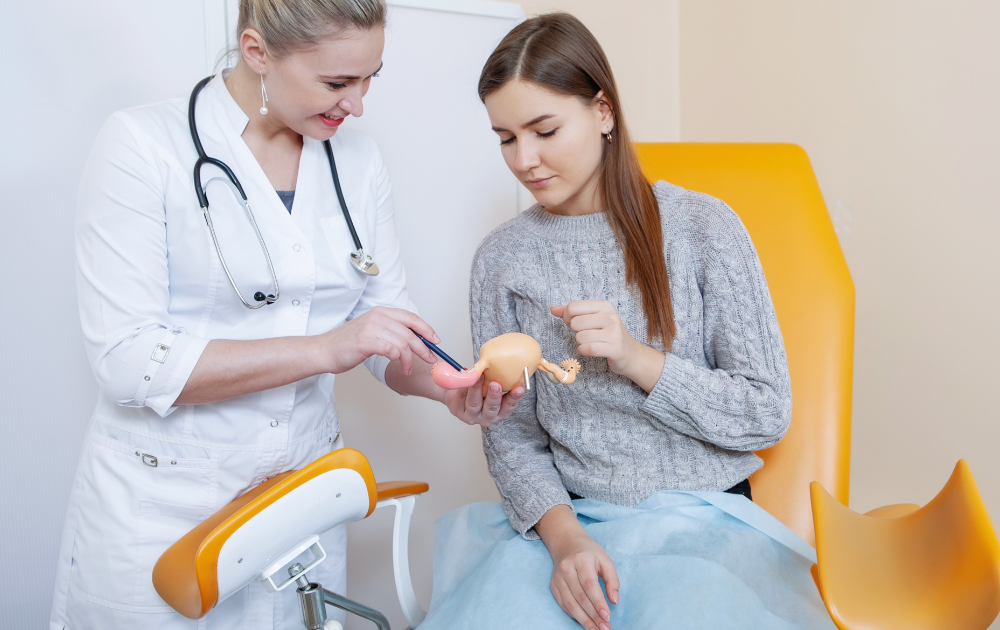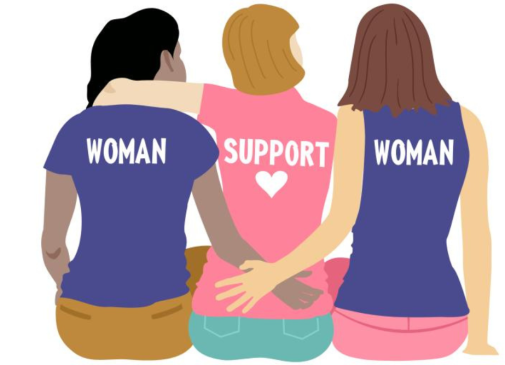
You’re sitting at your gynecologist appointment listening to your physician explain the numerous different kinds of IUDs, which stands for intrauterine devices. It can be extremely overwhelming choosing the right IUD for your body especially when some IUDs there are many benefits and side effects to decipher. And if you already have an IUD, you may want to see how the type of metal used in different types of non-hormonal birth controls could be the cause of your period changes.
Whether you’ve been thinking about getting a copper IUD or you already have one, it’s important to know how it could affect your period’s length, heaviness, and regularity. You may have heard that hormonal birth controls can help decrease heavy bleeding or cramps, but do non-hormonal copper IUDs do the same?
What Is a Copper IUD?
A copper IUD is a non-hormonal birth control that comes in the form of a small piece of flexible plastic shaped like a “T” that has copper wire wrapped around the base. There is currently only one brand of copper IUD allowed in the U.S., which is called ParaGard. It is usually placed within the uterus and left for 8 to 12 years. Many women choose copper IUDs because they offer a long-term solution for preventative pregnancy.
The copper IUD works by constantly releasing a small amount of copper into the uterus. The copper IUD works by stopping the sperm and egg from connecting, as well as changing the lining of the uterus. The constant release of copper makes it difficult for a fertilized egg to stick to the uterine lining. Copper IUDs are sometimes used as an emergency contraceptive because of their effectiveness. The copper metal in the IUD is toxic to sperm; therefore, they won’t have a chance of fertilization even if they end up reaching the egg.
Copper IUD Side Effects
Despite copper IUD side effects, many women like that it is free of artificial hormones, doesn’t interact with any medications, can be used while breastfeeding, and offers a long-term solution to prevent pregnancy. However, even though they may be non-hormonal, copper IUD side effects may include:
- Ectopic pregnancies while still using a copper IUD
- Severe menstrual bleeding
- Painful cramps
- Abdominal, leg, and back pain or pressure
- Irregular bleeding
- Missed cycles
- Bleeding or spotting between periods
- Pain during sex
Most of these are temporary side effects that get better with time. If you are still experiencing any of the above copper IUD side effects after six months, it’s important to ask your doctor to see if another medical condition could be the cause.
A less common copper IUD side effect is weight gain. Even though weight gain is primarily associated with hormonal contraceptives, women who are between the ages of 35 to 45 have reported weight loss after removal. Although copper IUD side effects like weight gain have not been proved.
Why Are Periods Heavier with Copper IUDs?
Copper IUDs are commonly associated with bleeding in between cycles, heavy flow, and/or lengthy periods lasting more than seven days. For some women, they can also cause severe cramping as well as leg and back aches. These copper IUD side effects can last a few short weeks to almost six months after insertion. If your bleeding is extremely heavy and interfering with your life, you should consult a women’s health specialist about your symptoms.
According to a study published by the National Center for Biotechnology Information (NCBI), women with copper IUDs tend to have periods that are 20 to 50% heavier for 12 months after their placement. However, some women report heavy periods and irregular bleeding lasting for years.
Although researchers are still determining why periods are heavier with copper IUDs, one of their theories involves the hormone: prostaglandin. Prostaglandins are fats made in your body when tissue damage occurs. When a copper IUD is placed within the uterus, some light tissue damage may occur prompting this release of prostaglandins. When they are released, those tissues become inflamed so they can heal properly. However, this still does not fully explain why some women experience heavy periods with a copper IUD, and even after removal.
Does the Copper IUD Make Your Period Longer?
Yes, getting a copper IUD like ParaGard often causes women to experience longer periods. Some women have reported experiencing eight to 15-day periods for the first three to six months after their copper IUD insertion.
Does the Copper IUD Cause Irregular Periods?
As your body is adjusting after your placement or removal, copper IUD side effects sometimes include irregular periods. Unfortunately, bleeding in between periods with copper IUDs is quite normal. The copper IUD may cause bleeding in between cycles when you’re not on your period, light to moderate spotting, and periods that are more difficult to track.
Women often report period changes after their copper iud removal more than when they first get it inserted.
Copper IUDs and Missed Periods
If you choose a hormonal IUD, missed or the complete cessation of periods could occur depending on the brand you choose. However, copper IUDs and missed periods are quite rare. This is because copper IUDs don’t release hormones, but small amounts of copper. Because they work differently at preventing sperm from fertilizing eggs, copper IUDs don’t cause missed periods. If you have missed your period and are using a copper IUD, contact your doctor immediately.
Other Causes of Period Changes
Even though we know that copper IUDs can often cause periods to be heavy, lengthy, or irregular it doesn’t necessarily mean it’s the only cause. There are a few different reasons why you could be experiencing heavy, long (lasting more than 10 days at a time), or irregular periods. Some of these include:
- Hormone issues
- Perimenopause complications
- Certain medications
- Uterine or cervical cancer
- Problems related to pregnancy
- Adenomyosis
- Uterine fibroids or other uterine growths
If you’ve recently had a copper IUD removed, you may be used to heavy, long periods as well as bleeding in between cycles. Although two conditions: uterine fibroids (benign growths that develop within or outside the uterus) and adenomyosis (where the endometrial tissue grows within the uterine wall) could contribute to painful, heavy periods.
Both fibroid and adenomyosis symptoms could be mistaken for copper IUD side effects. However, it’s important to consult your doctor or a fibroid specialist if your symptoms are interfering with your daily routine.
Can a Copper IUD Cause Fibroids?
The simple answer is, no. Because copper IUDs are considered non-hormonal types of birth control, there is no evidence to support that they could cause uterine fibroids. The development of uterine fibroids is often influenced by an influx of hormones. This is because fibroids contain more estrogen and progesterone receptors than normal uterine muscle cells.
Also, pregnancy can stimulate the growth of fibroids because your body experiences a spike in both hormones.
Copper IUDs and Fibroids: What’s the Deal
Because copper IUDs don’t release hormones like others do, they aren’t used to help treat uterine fibroids symptoms like heavy bleeding or cramps. On the contrary, copper IUD side effects do the complete opposite. If you’re looking for an easy treatment solution for fibroids, copper IUDs would not be recommended.
Either when you have one or you get one removed, copper IUDs can actually mask your fibroid symptoms if you’re used to dealing with chronic period pain. It’s important to get tested for fibroids and consult an experienced specialist if you’re concerned about copper IUDs and fibroids. Common uterine fibroid symptoms include:
- Pain during sex
- Heavy menstrual bleeding
- Periods lasting more than 10 days at a time
- Irregular bleeding sometimes between cycles
- Fatigue caused by anemia
- Lower back or abdominal pain
- Severe pelvic pain and cramping
- Enlarged uterus, mimicking a pregnancy
- Constipation or bloating
As you may notice, uterine fibroid symptoms and copper IUD side effects share similar issues. That’s why it’s always important to track your symptoms to know what could be the root cause of your period pain or bleeding.
Copper IUDs and fibroids can also contribute to serious iron deficiency. Additionally, if you have uterine fibroids or have low-anemia levels, copper IUDs may not be a right fit for you. Because copper IUDs often increase menstrual blood loss, this may result in iron deficiency anemia. It’s important to consult your physician or a fibroid specialist before getting a copper IUD implant. Your physician will measure your anemia levels to see if you could be a candidate or not.
Treating Fibroids Before Getting a Copper IUD
Unfortunately, you may go to your doctor expecting to get an IUD placed, but leave without one. This can happen if you have a uterine fibroid or other abnormality. This can be extremely frustrating, especially if you were planning to opt for non-hormonal birth control. Thankfully, uterine fibroids can easily be treated with an outpatient, nonsurgical method known as Uterine Fibroid Embolization (UFE). UFE works by targeting the fibroids’ blood source and blocking it with tiny embolic material that stays within the artery. Over time, your fibroid(s) will continue to shrink until it is absorbed by your body. Once your fibroid has shrunk, you can revisit getting copper IUD.
At the Fibroid Fighters Foundation, we help connect you with top-rated interventional radiologists (fibroid doctors) who can diagnose your condition and recommend a treatment process that fits your individual needs. Give us a call at 855.455.5262 or contact us conveniently online.







